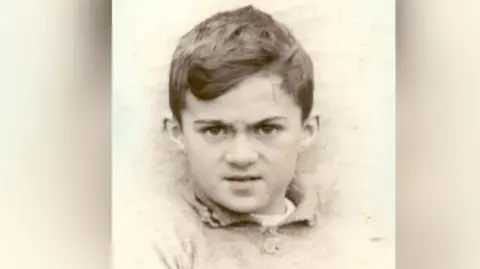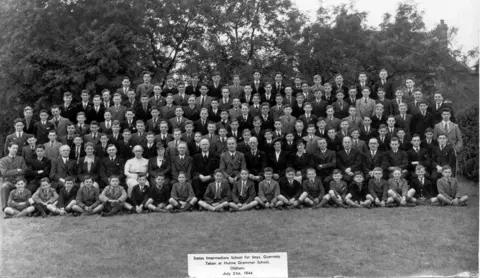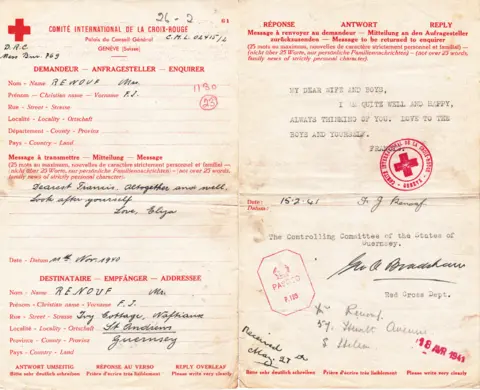Evacuee remembers time in north west 84 years on
 Eric Renouf
Eric RenoufAs it became clear that a German invasion was inevitable 84 years ago, tens of thousands of people were evacuated from Guernsey.
Many of them were school children who, unlike their Jersey counterparts, were taken to England with their teachers.
Eric Renouf, now aged 92, was eight when he was evacuated with St Andrew’s school and taken to the North West with his three brothers.
He was joined by his mother, but his father and grandparents remained until the end of the World War Two.
 Eric Renouf
Eric Renouf"I have got very few memories of the evacuation, I can sense being in a crowded space in the boat.
"The other thing I remember is when we arrived in England, my first time there, we were given drinks when we got off the boat.
"Then in the train, my first time in a train, I remember looking out of the window trying to see what we were passing."
The Channel Islands where occupied for five years between 1940 until the end of the war in 1945.
In that time, Mr Renouf moved up from primary school, to secondary.
"During that time, I got the scholarship for the Guernsey Intermediate School for Boys, which was housed at Hulme Grammar School in Oldham."
 Eric Renouf
Eric Renouf'A good two years'
Mr Renouf lived in the Lancashire mill town during term-time and said he has clear memories of his time.
"They had stepped classrooms, which made it easier for the teachers to see us all.
"One specific memory I have of myself is of being lined up along with a few other boys.
"Apparently we had been late and we were caned outside the main entrance to Hulme Grammar.
"But it was a good two years."
Mr Renouf's mother, Eliza, evacuated with him and his two younger brothers, Kenneth and Rodney.
But his father, Francis, and grandparents stayed on the island, living through the occupation.
Communication delays
Contact between the Channel Islands and Britain was cut off following the invasion a week after the evacuation.
Mr Renouf said: "Letters were sent, but most of them didn't arrive in time and after that there was no contact."
It was only six months later when both the UK government and the Germans in Guernsey allowed very short Red Cross messages to be sent.
"The very first Red Cross message mum sent to dad was on 11 November 1940, we left in June.
"Dad replied on 15 February 1941. So he has received the message, replied to it straight away and mum received it, she noted it, 27 May."
 Eric Renouf
Eric RenoufDuring the war, both of Mr Renouf's grandfathers passed away during the occupation.
He, his mother and his brothers did not find out until months later.
Mr Renouf said censorship was also an issue, with the British and Germans cutting out any messages "they didn't like".
Eric, his brothers and the other many thousands of people who fled the advancing Germans five years earlier.
He said that the ship he was on passed German ships leaving St Peter Port and a "spontaneous boo" rang out from the children.
Once the boat had docked in the harbour, Mr Renouf went to meet his dad at the Weighbridge.
"The first view of dad was through barbed wire.
"As an eight year old I had a memory of him and recognised him, as did Ken.
"But for my younger brother Rodney, he would have only been two when he was evacuated, so he had no memory of dad whatsoever.
"The return must of been a very confusing one."
Mr Renouf visited Oldham and Hulme Grammar again about a decade ago.
He said it was "heart warming".
"We were visiting family up north and we went to Oldham and to the school.
"I introduced myself as a Guernsey Boy and we were taken to the headmaster's office.
"We had a good chat and it was interesting to see the blue plaque in the headmasters room noting that the Guernsey school had been there from 1940 to 1945."
Follow BBC Guernsey on X (formerly Twitter) and Facebook. Send your story ideas to [email protected].
